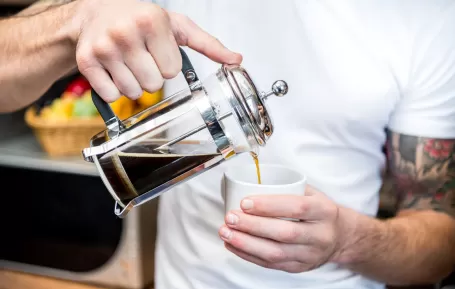Many of us can’t start the day without a strong cup of coffee. For some, it’s that morning wake-up call for some, while for others, it’s just part of the morning routine. While many of us love the caffeine hit and the boost it gives us, there are those who either don’t like the effect of caffeine or can’t tolerate it for other reasons. In this instance, decaffeinated coffee is the drink of choice. While it tastes similar (less strong and bitter) and smells the same, it doesn’t have the same effects as regular coffee.
Trace of Caffeine
While it is called decaffeinated, it is not 100% caffeine-free. Removing the caffeine removes around 97%, leaving a trace. However, the impact of this small amount of caffeine significantly reduces the amount of caffeine that you are ingesting and the effects are negligible.
The Impact of Caffeine
For those who suffer from anxiety or get “jittery” after a cup of coffee, decaf is a popular choice, helping to improve sleep. Pregnant women often switch to decaffeinated coffee to continue to enjoy their favourite drink without the added caffeine.
Those who enjoy coffee later in the day may switch from regular coffee to decaf coffee to ensure that this popular stimulant doesn’t keep them awake when they go to bed. Many people can’t drink coffee after a certain time for this very reason. It’s not uncommon to hear people say ‘morning coffee’ and ‘afternoon tea’.
Removing coffee from your daily routine can be tough for many, especially those who love this popular warm drink’s taste, smell, and general feeling.
This is when decaffeinated coffee offers the perfect alternative. It is very similar in appearance, taste and smell to regular coffee. It just contains little caffeine.
How is the Caffeine Removed?
There are four different processes of removing the caffeine from the coffee beans;
- Direct Solvent
- Indirect-Solvent
- Swiss Water
- Carbon Dioxide
Direct Solvent Method
While the beans come into direct contact with chemicals to speed up the process, the roasting of the beans at 400+ degrees mean that the chance of finding any chemicals in the coffee is extremely low. This is probably the cheapest method of decaffeination meaning that you will pay less for your coffee.
Indirect-Solvent Method
The beans are left to soak in hot water. Once the water has absorbed the caffeine, it is treated in a different tank with a solvent. This solvent will only consume caffeine. This means the flavour and oils remain. The solvent is then skimmed off the top, the beans are returned to the tank to re-absorb the flavours and proteins. This means that the beans never come in direct contact with the water.
Swiss Water Method
Probably the purest way to remove the caffeine without the use of chemicals but using water does slow down the decaffeination process and means that other proteins and compounds are removed. The water used is oversaturated with coffee compounds to avoid losing the flavour. While this method will produce a more expensive coffee, it is the purest.
CO2 Method
A more recent method involves using carbon dioxide in place of chemicals. The beans are soaked in water before being placed in a stainless steel container. Once sealed, liquid CO2 is forced into the coffee at high pressure per square inch. The CO2 then dissolves and withdraws the caffeine leaving behind all the flavour.
What Happens to the Caffeine After Decaffeination?
In case you were wondering, the caffeine does not go to waste. It is used in fizzy, caffeinated drinks, pharmaceutical products, skincare products, caffeine shampoos and candy. Some of these products are ingested, others aren’t. Caffeine is a huge business, and this by-product of decaf coffee is extremely popular.
It’s Not Just Coffee
Many teas also contain caffeine. Caffeine can be removed to produce decaffeinated tea as well. While a cup of tea doesn’t have the same effects as coffee, those who are averse to caffeine, or have removed it from their diet, will also choose decaf tea.
For those workplaces that like to cater for all of their staff, it is always a good idea to offer a decaf option. Among our popular ground coffee and coffee beans, you will find quality decaffeinated coffee to satisfy even the most discerning taste buds.
Take a look at our decaf tea and coffee options in the store, here.



